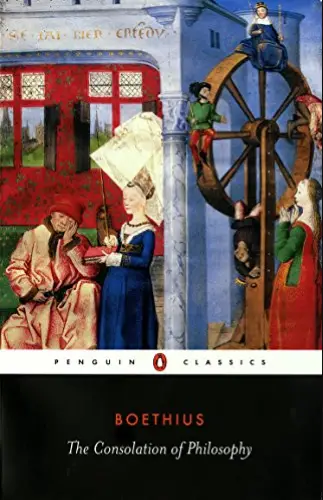On the Consolation of Philosophy
Book Author: Boethius
Summary reviewed by:
Terrence Timmons
Terrence Timmons
Analyst
Bachelor of Arts (BA), University Of California, Santa Barbara 2019
With over 4 years of experience as an analyst. Terrence Timmons is committed to analyzing summaries without compromising on quality.
On the Consolation of Philosophy: Summary
In the depths of despair, can wisdom and truth alone rescue a man? Such is the question that Boethius, an influential scholar of late antiquity, sought to answer in his deeply thought-provoking work "On the Consolation of Philosophy". This timeless masterpiece blends together the lyrical beauty of poetry and the intellectual rigor of philosophical discourse, addressing universal questions that pertain to the nature of happiness, fate, free will, and God.
Imprisoned and stripped of his political status, Boethius finds himself in the throes of deep despair and bitterness. However, he is not left alone in his agony. A divine figure, Lady Philosophy, arrives to counsel and console him, leading him through a dialectical journey that peels away his superficial understandings and makes him confront the deeper truths about the human condition.
Boethius begins his philosophical inquiry consumed by a sense of injustice and afflicted by the misfortunes befalling him. He initially views his circumstances as the whims of fickle Fortune. Yet, Lady Philosophy gradually leads him to understand that real happiness does not lie in the temporary and capricious gifts of Fortune—such as wealth, fame, or power—but in the eternal and unchangeable good, that is, the Supreme Good, or God.
The dialogue then delves into the more complex matters of divine foreknowledge, human free will, and Providence. Here, Boethius masterfully elucidates the idea that God, existing outside of time, perceives all things in a timeless "eternal present." This divine perspective does not infringe on human free will, for God's knowledge of our choices is not causative but rather reflective of our freely made decisions.
By the end of the journey, Boethius is consoled. He has been reminded of the transient nature of worldly goods and the enduring character of true happiness rooted in divine wisdom. Boethius thus provides his readers with not just a consolation for himself but for all who journey through life's challenges and seek answers to its most profound questions.
On the Consolation of Philosophy: Genres
Philosophy
Theology
Christian Philosophy
Neoplatonism
Metaphysics
Philosophy of Religion
Political Philosophy
Wisdom Literature
On the Consolation of Philosophy: Main Characters
Boethius: The author and protagonist, Boethius is a scholar in despair, initially perceiving his misfortune as an injustice. His values are shaped by the dialectical process and the insights of Lady Philosophy, from an attachment to worldly goods to an appreciation of divine wisdom and providence.
Lady Philosophy: The embodiment of divine wisdom, Lady Philosophy guides Boethius in his intellectual journey. Her values include the promotion of wisdom, understanding, and truth. She exemplifies this when she encourages Boethius to see his misfortunes in a new light, viewing them as opportunities for growth rather than mere afflictions.
On the Consolation of Philosophy: Themes
The Nature of Happiness: Lady Philosophy posits that true happiness lies not in the fickle gifts of Fortune but in the eternal good, God. This is evident when she tells Boethius that worldly goods like wealth, power, and fame are fleeting and can never provide true happiness.
The Relationship Between Fate and Providence: Boethius learns that while fate governs earthly events, it is ultimately subject to divine providence. This is exemplified when Lady Philosophy explains that everything, even seeming misfortunes, is part of a rational and benevolent divine plan.
The Compatibility of Divine Foreknowledge and Human Free Will: Boethius illustrates that God’s foreknowledge of our choices does not constrain our free will, as God exists beyond time and perceives all events in an eternal present. This theme surfaces during the exploration of whether God’s foreknowledge infringes upon human freedom, leading to the conclusion that it does not.
The Consolation of Philosophy: The overarching theme of the work, it implies that true solace can be found in wisdom and philosophical understanding, particularly in recognizing the transient nature of worldly goods and the permanence of divine wisdom. This theme is best exemplified in Boethius’s transformation, as he moves from despair to understanding, finally finding consolation in philosophy.


On the Consolation of Philosophy
Date Published: 524 AD
Disclaimer: As an Amazon Associate I earn from qualifying purchases.




